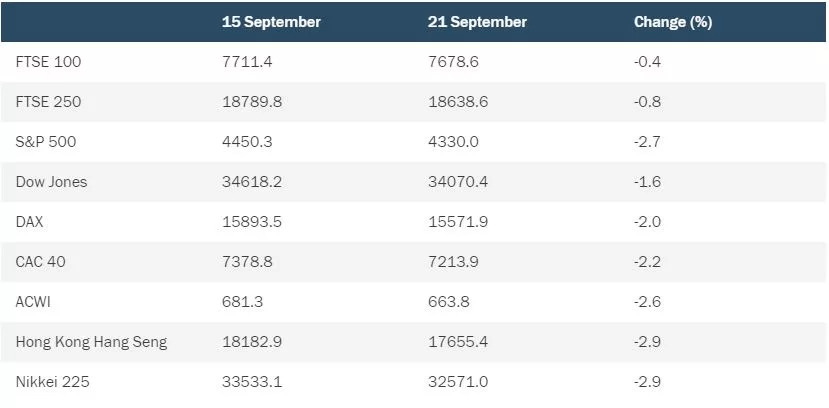Fears that interest rates will remain at higher levels for longer than previously expected have sparked losses on global stock markets
While central banks in the United States and the UK temporarily paused their programmes of monetary policy tightening this week, investors are worried that the string of rate cuts predicted for 2024 are less likely to materialise.
The Federal Reserve and the Bank of England cited the inflationary pressures caused by rising oil prices as justification for maintaining rates at their present levels for the foreseeable future, and possibly even increasing them before the end of the year. There was some positive news in the shape of an upgraded forecast for global growth in 2023 from the OECD, although concerns about the fragility of China’s real estate sector again weighed on sentiment.
United States
On Wall Street, the Dow Jones Industrial Average ended trading on Thursday 1.6% down for the week so far, with the S&P 500 slumping 2.7%. Technology stocks were particularly weak in the US due to fears of permanently higher interest rates, as well as warnings of a slowdown in the global semiconductor market. Industrial action at several of America’s biggest auto manufacturers also held stocks back, while there were signs that consumer spending was starting to weaken.
UK
In the UK, the FTSE 100 closed on Thursday 0.4% down for the week so far, with share prices in London outperforming their counterparts in Europe, America and Asia given continued rises in the price of oil, which benefited the FTSE’s major energy firms. Crude values approached $100 a barrel earlier in the week – their highest level since last November – before slipping back on concerns that high interest rates could stifle global growth. An unexpected fall in UK inflation in August was reported on Wednesday, allowing the Bank of England to keep rates on hold for the first time in over a year. However, officials warned that talk of a cut was highly premature.
Europe
In Frankfurt, the DAX index ended Thursday’s session down 2% for the week, while France’s CAC 40 lost 2.2%. Revised data revealed that eurozone inflation was reported to have fallen more quickly than anticipated in August, easing the pressure on the European Central Bank to raise interest rates again in the short term. However, analysts suggested the eurozone economy would fall into recession in the second half of this year, while the OECD’s forecasts said Germany would have the weakest economy in the G7 in 2023.
Asia
In Asia, the Hang Seng index in Hong Kong dipped 2.9%, with concerns about US interest rates on Thursday adding to another gloomy week in China. Reports of a police investigation into alleged fraud at a major real estate company sent share prices tumbling on Monday, while investors remained unconvinced that a smattering of upbeat output data heralds a genuine turnaround for the beleaguered Chinese economy. Japan’s Nikkei 225 index of leading shares also declined 2.9%, with weakness in technology stocks compounded by fears that the Bank of Japan may be on the verge of embarking on its own programme of monetary tightening.

Note: all market data contained within the article is sourced from Bloomberg unless stated otherwise, data as at 21 September 2023.

